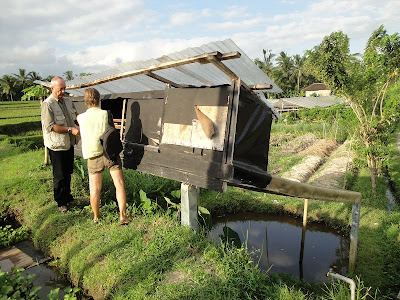our group with our compost guide

huge pipes are aerating the compost heaps

After an early babi guling lunch at a Warung we reached the plant around 11am. David, the enthusiastic, crazy and persistent heart of the project, greeted us and a skillful employee took us on a tour. We were very impressed by the sheer size of the plant and the little smells. In a big open hall several huge heaps of organic waste lay in a row. 40 tons of waste are daily delivered from the region of Gianyar to the plant. The drivers have to pay an entrance fee. At one end of the long hall workers from Java sort the waste into organic and non-organic. They are paid 40000Rp. per ton. The bigger parts in the organic waste are shreddered first and then put together with the smaller parts onto a heap. This is the first heap in the row. All heaps are aerated several times every hour and after 2 weeks turned over to the place of the preceding heap. The last heap of the row is sieved and packed into bags. The rest goes through the process again. Some of the mature compost is mixed with cow manure and then granulated to be used as fertilizer. The plastic which was sorted out is recycled into various products like shopping bags and woven storage boxes.
end of the composting process: sieving machine

After the tour David offered us some time for answering questions and sharing some insights like:
- How the plant covers its costs.
- How soil analysis is done by measuring pH, connectivity (mineral content) and content of organic material.
- How the diseases of coklat and banana trees probably can be healed by the microorganisms contained in compost.
- The principles of aerob vs. anaerob compost.
- How the kyoto protocol works by selling CO2 credits.
- How difficult it is to sell the compost because many farmers already forgot how to use compost. The price for a 20kg bag high quality compost is 20'000Rp.
As a souvenir we all got some red tiger compost worms.
View from Sari Organik Restaurant in Ubud

Our next stop was Ubud, where we walked through the rice fields to Sari Organik, an organic farm with restaurant. We had a delicious lunch with wonderful view over the rice fields. Then we visited the organic garden.
Solar drier at Sari Organik, Ubud

On the drive home we discussed about promoting walking and setting up a website for trecking in Buleleng connecting existing information and documenting new discoveries.

















